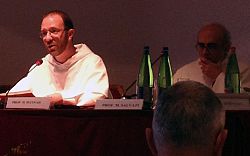Fr. Hannah speaks in Rome on Thomistic metaphysics and understanding the literal sense of scripture
Friday, Mar. 04, 2016
Special to the Intermountain Catholic
ROME — For anyone who cracks open a Bible and takes the time to read what’s inside, one of the first questions that grips a reader of sacred scripture regards how to approach the narratives, prophecies, and poetry that so many people of faith hold dear.
One asks: “Are these things literally true or figuratively true?”
With the Bible, though, there are never any easy answers. Even something as plain as the literal meaning of the text, for example, can lead to heated debate. What do the words themselves actually mean? And in what language? And to whom are they addressed: the reader today, the reader from thousands of years ago, the writer? The questions are endless, and each can become a lifelong quest for clarity.
During a conference in Rome Feb. 25-27, Fr. Peter Hannah, OP, of St. Catherine of Siena Newman Center in Salt Lake City, presented a paper on how the philosophy of St. Thomas Aquinas can be used to help tease out the different parts to the literal sense of sacred scripture.
Using the structure of final and formal causes that make up Thomistic metaphysics, Fr. Peter set out to make distinctions regarding the intention of the sacred authors and the divine inspiration behind them, as well as how these intentions interact with the way in which the sacred text is received by a reader.
Fr. Peter spoke to fellow Dominicans and other professors and students gathered at the Colloquium on Dei Verbum at the University of St. Thomas Aquinas in Rome, better known as the Angelicum; his remarks were met with appreciation by the attendees.
The conference was convened to celebrate the 800th anniversary of the founding of the Dominican order as well as the 50th anniversary of the promulgation of the Vatican II dogmatic constitution on revelation called “Dei Verbum.” A couple hundred people attended the conference, which brought both expert and amateur scriptural exegetes together with some of the best theologians associated with the Dominican order.
“The conference has been a marvelous opportunity to meet and network with other Dominicans from throughout the world, the friars and the sisters, in our collaborative task of preaching for the salvation of souls. I’ve met fellow friars and sisters from around the world; it’s a very culturally rich and diverse atmosphere,” Fr. Peter said. “It has been a great opportunity to meet with scripture scholars and theologians to talk about an issue that is an important one for the Church today: the relationship between exegesis and theology.
“As St. Jerome says, and as the Second Vatican Council emphasizes, scripture is the soul of sacred theology and ignorance of scripture is ignorance of Christ,” Fr. Peter continued. “The Second Vatican Council desired to initiate a renaissance in knowledge of the Biblical text, because holiness and knowledge of God is not just for priests; it’s for all people. In light of the universal call to holiness made by the Second Vatican Council, the mission of the Dominicans is critical because as preachers and teachers of the Word, we have a special duty to try to bring the riches of sacred scripture into the midst of people’s lives, and inspire them to read the Bible on their own, study it, assimilate it, and use it as a personal encounter with Christ so they can more fully represent Christ in the world.”
Fr. Peter also benefitted from being able to visit the monumental historical sites of the Eternal City.
“I had come to Rome one time before, before I was Catholic,” he said. “When I came back, the first thing I did, to try to shake off the jet lag, was to go for a jog. So I jogged around the Roman Forum, the Colosseum, the Circus Maximus, and the Capitoline Hill, and I found it was a great way to reorient myself.”
For questions, comments or to report inaccuracies on the website, please CLICK HERE.
© Copyright 2025 The Diocese of Salt Lake City. All rights reserved.
© Copyright 2025 The Diocese of Salt Lake City. All rights reserved.


Stay Connected With Us